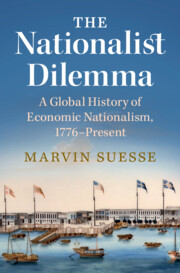‘America First. Getting Brexit Done. These slogans illustrate that we live an era of economic nationalism. The Nationalist Dilemma is an insightful, erudite, timely, and lucid account of the global history of this concept from Alexander Hamilton to Donald Trump.'
John Turner - author of Boom and Bust: A Global History of Financial Bubbles
‘This wide-ranging, thought-provoking, and topical survey provides an excellent introduction to the many varieties of economic nationalism that have emerged over the past 250 years.'
Kevin O'Rourke - author of Power and Plenty: Trade, War, and the World Economy in the Second Millennium
‘In his engaging and insightful book, Marvin Suesse shows with great skill how economic nationalists develop their ideas and how these have influenced ‘practical men’ in politics through time and space. By connecting the experiences and embedding them in history, the book convincingly exposes the conditions that make economic nationalism rise or remain irrelevant.’
Markus Lampe - Professor of Economic and Social History, Vienna University of Economics and Business
‘How to resolve contradictory impulses - romanticized past versus expansionist future, suspicion of foreign connections versus global economic engagement - is the Nationalist Dilemma. Suesse performs an invaluable service in explaining these conflicts, tracing them through the histories of thirty countries and three centuries. An essential book for understanding the modern world.’
Robert Allen - Global Distinguished Professor of Economic History, New York University
‘Economic nationalism is fraught with contradictions, Marvin Suesse shows in this important book. Nationalists wish to promote economic self-sufficiency but also economic development, two objectives that can, and frequently do, end up at odds. Now that economic nationalism is back - in the U.S., in Europe, and in China - it is hard to imagine a more timely volume.’
Barry Eichengreen - University of California Berkeley
‘This dazzling history by Marvin Suesse focuses squarely on the clash between nationalist passions and economic interests. Through a collection of brilliant case studies spanning time, region, and level of development, Suesse explores how political pressures for national advancement and security have always shaped countries’ approaches to engagement with world markets. The current downswing in the globalization cycle - apparent in a series of disintegrative events since 2016 - supports Suesse’s argument that nationalism is here to stay. Anyone hoping to understand and navigate that reality will find this book to be an indispensable resource.’
Maurice Obstfeld - University of California, Berkeley
‘Marvin Suesse has produced this excellent book on nationalism right in time. He dissects a crucial notion at the moment of its irresistible return on the political stage. He does so by the help of an historical analysis, including fundamental ideas from the history of economic thought. The result is an extremely useful book…’
Stefano Solari
Source: History of Economic Thought and Policy



